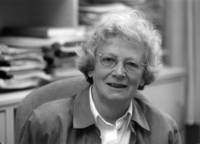


Sigrid Peyerimhoff studied physics, but was already dealing with quantum chemical calculations in her doctoral thesis. In 1972 she became a professor for physical and theoretical chemistry at the University of Bonn. For a long time she remained the only woman in such a chair.
Sigrid Peyerimhoff was born on January 12, 1937 in Rottweil, the oldest town in Baden-Württemberg. She grew up in Heidenheim an der Brenz, where she graduated from high school in 1956. She then decided to study physics at the Justus Liebig University in Gießen, which she graduated in 1961 with a diploma. Among her academic teachers was the well-known physicist Wilhelm Hanle (1901-1993), a student of James Franck (1882-1964). The latter shared the 1925 Nobel Prize in physics with Gustav Hertz.
In her doctoral thesis at the University of Gießen , Peyerimhoff worked on quantum chemical calculations of the hydrogen fluoride molecule under the supervision of Bernhard Kockel (1909-1987), Professor of Theoretical physics. She received her PhD in 1963.
As a postdoc, Peyerimhoff conducted research in the USA until 1967. As a scholarship holder of the Volkswagen Foundation, she initially worked at the University of Chicago with Clemens Roothaan (1918-2019) and Robert Mulliken (1896-1986). Mulliken received the 1966 Nobel Prize in Chemistry for his fundamental contributions to the electronic structure of molecules and chemical bonding. Further research stays took Peyerimhoff to Washington State University in Seattle and then - with a leave of absence from her work in Gießen - to Princeton University in New Jersey and Michigan State University.
In 1967 she habilitated in theoretical physics at the University of Gießen . She then taught for two more years as a lecturer in Gießen and then went to Mainz as a scientific adviser and professor. During this time she spent several guest stays in the USA at the University of Nebraska-Lincoln in Lincoln. There, she and the US chemist Robert Buenker (b. 1942) had a powerful computer at their disposal for the complex calculations. Peyerimhoff had worked together for many years with Buenker, who had previously worked as a visiting professor in Gießen and Mainz. In his mid-thirties, in 1972, Peyerimhoff accepted a professorship for physical and theoretical chemistry at the Rheinische Friedrich-Wilhelms University in Bonn. For a long time she remained the only woman in Germany to hold such a chair.
Peyerimhoff made fundamental contributions to ab initio calculations in quantum chemistry. This is understood as a method for solving the Schrödinger equation using only natural constants. This work was also important for environmentally relevant reactions in the atmosphere, for example ozone. Overall, Peyerimhoff published about 500 studies in scientific journals and anthologies. In 1988 she received the Leibniz Prize of the German Research Foundation, one of the most important German research awards. In 2002 she retired from the University of Bonn.
In addition, Peyerimhoff took on important tasks and functions in scientific societies and committees. In 1987 she was a founding member of the Academy of Sciences in Berlin and from 1990 to 1996 Vice President of the German Research Foundation. In 1999 she was appointed a member of the German Academy of Sciences Leopoldina, which awarded her the Cothenius Medal for her life's work in 2007. Peyerimhoff is also a member of the German Academy of Science and Technology, the Academia Europaea and the North Rhine-Westphalian Academy of Sciences and Arts. From 2006 to 2009 she was President of the International Academy of Quantum Molecular Science, to which she was elected in 1986.
In 2008, Peyerimhoff was awarded the Grand Cross of Merit of the Federal Republic of Germany. The oldest German scientific society, the Society of German Natural Scientists and Physicians founded in 1822, awarded her the Alexander von Humboldt Medal in 2018.
The Bonn University Foundation has been awarding the Sigrid Peyerimhoff Advancement Young Scientist Award and the Sigrid Peyerimhoff Research Award since 2020. The prize not only honors outstanding research, explained the founder Peyerimhoff on the occasion of the establishment of the endowment fund: "It is also a sign of encouragement and encouragement to find the way into science and to dare to go it. A path that has given me so much myself.” Since 2021, the Working Group Theoretical Chemistry of the German Chemical Society has also been awarding the Sigrid Peyerimhoff PhD Award Prize to outstanding doctoral theses in the field of theoretical chemistry.
Current: In 2022, the GDCh awarded Sigrid Peyerimhoff the Erich Hückel Award . Interview with the award winner (published in "Nachrichten aus der Chemie", April 2022).
a notice
The texts published in this series do not claim to be scientific publications. Authors and other people involved are not experts in the history of science. The purpose of the series is to introduce the mostly unknown women chemists and to remind you of the well-known women chemists. We encourage readers who want to know more to study academic Literature on the women featured. In some cases there are detailed chemical-historical works.
authors
Prof. Dr. Eberhard Ehlers
Prof. Dr. Heribert Offermanns
Editorial processing
Dr Uta Neubauer
project management
Dr Karin J. Schmitz (GDCh public relations)
The authors are responsible for the content of the biographies.
The content presented on these pages has been carefully compiled. However, the authors, Editorial staff and publishers assume no responsibility or liability for the completeness and correctness of the content or for typographical errors.
This page has been machine translated. If you have any feedback or comments please feel free to contact us. 
last modified: 11.07.2024 14:29 H from N/A